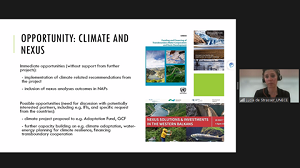Representatives from the water, energy, and environment sectors of Bosnia and Herzegovina, Montenegro, and Serbia - the three riparians of the Drina River Basin - met on 4 May 2022 to discuss ways forward on sustainable development and transboundary cooperation.
The meeting of the Steering Committee for Nexus activities in the Drina basin, organized by UNECE and Global Water Partnership - Mediterranean with the support of the Austrian Development Agency (ADA), was the 3rd and last under the framework of the project “Promoting the Sustainable Management of Natural Resources in South-eastern Europe, through the use of the Nexus approach”.
At the meeting, representatives agreed on a Nexus Roadmap for the basin, which lays out 10 key objectives for coordinated cross-sectoral policy and transboundary governance. The objectives include suggested lines of action to unlock solutions in infrastructure development, information exchange, flow regulation, wastewater treatment, sediment management, sustainable renewable energy and agricultural development.
The Roadmap responds to the needs that were highlighted by the countries at the high-level workshop “Action across sectors and borders for the sustainable future of the Drina River Basin” held in Belgrade in 2019, and includes the recommendations from eight years of UNECE-supported work in the basin, which included multi-sectoral dialogues as well as analytical work and integrated water-energy modelling.
The Roadmap can assist and guide the implementation of EU’s Green Agenda for the Western Balkans at the Drina basin level, by ensuring that investments address considerations of all sectors, capture potential synergies and maximise the use of available resources and platforms.
The countries perspectives and visions, as well as expectations for future work, were introduced by Mr Mirza Hujic, Assistant Minister in the sector of water resources, tourism and environmental protection, Ministry of Foreign Trade and Economic Relations, Bosnia and Herzegovina; Ms Dragana Đukic, Head of Monitoring and Evaluation in the Directorate for Water Management, Ministry of Agriculture, Forestry and Water Directorate, Montenegro; and Ms Natalija Lukovic, Assistant Minister responsible for Green Energy, Ministry of Mining and Energy, Serbia.
In the Meeting, representatives also validated the Nexus Assessment Report for the Drina basin, prepared in the framework of the SEE Nexus Project, that focused on two issues: (i) a scenario analysis to explore the role of renewable energy – and hydropower in particular- in meeting the countries’ energy and climate objectives, and (ii) a legal and governance focused analysis of the options available to formalize transboundary flow regulation, also drawing from international examples. Two further outputs are being prepared in the framework of the project: an outline of a climate adaptation strategy for the basin and a project proposal for interventions on improving sediment management.
Participants expressed appreciation for the work carried out so far and stressed the importance to continue the cross-sectoral and transboundary dialogue in the basin, focusing on concrete actions and strong partnerships across countries, potentially with the development of a new project on the Nexus in the basin, focusing on energy security and environmental protection. They also emphasized that future activity should facilitate the implementation of the Green Agenda for the Western Balkans and work in close synergy with other ongoing projects and activities in the region, notably the Sava and Drina Integrated Development Program (SDIP) funded by the World Bank and coordinated by the International Sava River Basin Commission (ISRBC).
Improving transboundary cooperation is recognized as a key to unlock several opportunities, including further financial support to tackle climate change at the basin-level, to continue work on water and flood management, and to resolve any pending bilateral issues.
The presentations are available here.
